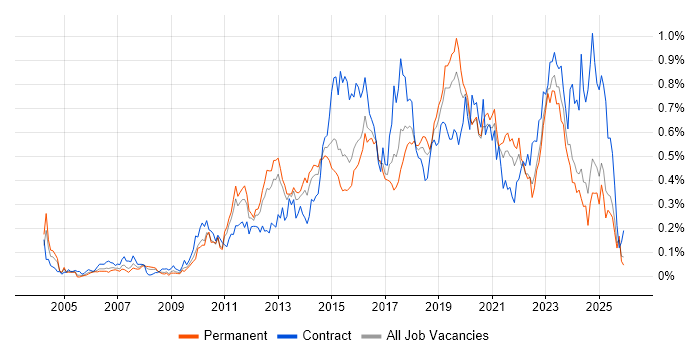Virtual Machine (VM)
England > Midlands
The table below provides summary statistics and salary benchmarking for jobs advertised in the Midlands requiring Virtual Machines skills. It covers permanent job vacancies from the 6 months leading up to 12 January 2026, with comparisons to the same periods in the previous two years.
| 6 months to 12 Jan 2026 |
Same period 2025 | Same period 2024 | |
|---|---|---|---|
| Rank | 209 | 213 | 197 |
| Rank change year-on-year | +4 | -16 | +103 |
| Permanent jobs citing Virtual Machines | 7 | 23 | 37 |
| As % of all permanent jobs in the Midlands | 0.090% | 0.36% | 0.65% |
| As % of the System Software category | 1.76% | 3.37% | 4.25% |
| Number of salaries quoted | 2 | 8 | 16 |
| 10th Percentile | £53,625 | £34,750 | £24,000 |
| 25th Percentile | £57,188 | £38,688 | £28,705 |
| Median annual salary (50th Percentile) | £63,750 | £51,500 | £52,500 |
| Median % change year-on-year | +23.79% | -1.90% | -4.55% |
| 75th Percentile | £69,688 | £55,313 | £61,250 |
| 90th Percentile | £72,875 | £71,250 | £71,250 |
| England median annual salary | £57,500 | £57,836 | £60,000 |
| % change year-on-year | -0.58% | -3.61% | +9.09% |
All System Software Skills
Midlands
Virtual Machines falls under the System Software category. For comparison with the information above, the following table provides summary statistics for all permanent job vacancies requiring system software skills in the Midlands.
| Permanent vacancies with a requirement for system software skills | 398 | 683 | 870 |
| As % of all permanent jobs advertised in the Midlands | 5.13% | 10.71% | 15.20% |
| Number of salaries quoted | 306 | 366 | 760 |
| 10th Percentile | £25,750 | £27,875 | £26,250 |
| 25th Percentile | £27,900 | £32,500 | £32,500 |
| Median annual salary (50th Percentile) | £35,933 | £45,000 | £47,500 |
| Median % change year-on-year | -20.15% | -5.26% | +2.70% |
| 75th Percentile | £57,188 | £62,500 | £60,000 |
| 90th Percentile | £70,625 | £74,572 | £68,750 |
| England median annual salary | £48,000 | £57,500 | £55,000 |
| % change year-on-year | -16.52% | +4.55% | - |
Virtual Machines
Job Vacancy Trend in the Midlands
Historical trend showing the proportion of permanent IT job postings citing Virtual Machines relative to all permanent IT jobs advertised in the Midlands.

Virtual Machines
Salary Trend in the Midlands
Salary distribution trend for jobs in the Midlands citing Virtual Machines.

Virtual Machines
Salary Histogram in the Midlands
Salary distribution for jobs citing Virtual Machines in the Midlands over the 6 months to 12 January 2026.
Virtual Machines
Job Locations in the Midlands
The table below looks at the demand and provides a guide to the median salaries quoted in IT jobs citing Virtual Machines within the Midlands region over the 6 months to 12 January 2026. The 'Rank Change' column provides an indication of the change in demand within each location based on the same 6 month period last year.
| Location | Rank Change on Same Period Last Year |
Matching Permanent IT Job Ads |
Median Salary Past 6 Months |
Median Salary % Change on Same Period Last Year |
Live Jobs |
|---|---|---|---|---|---|
| West Midlands | +17 | 6 | £75,000 | +42.86% | 2 |
| East Midlands | -17 | 1 | £52,500 | +31.25% | 6 |
| Virtual Machines England |
|||||
Virtual Machines
Co-Occurring Skills & Capabilities in the Midlands by Category
The following tables expand on the one above by listing co-occurrences grouped by category. They cover the same employment type, locality and period, with up to 20 co-occurrences shown in each category:
